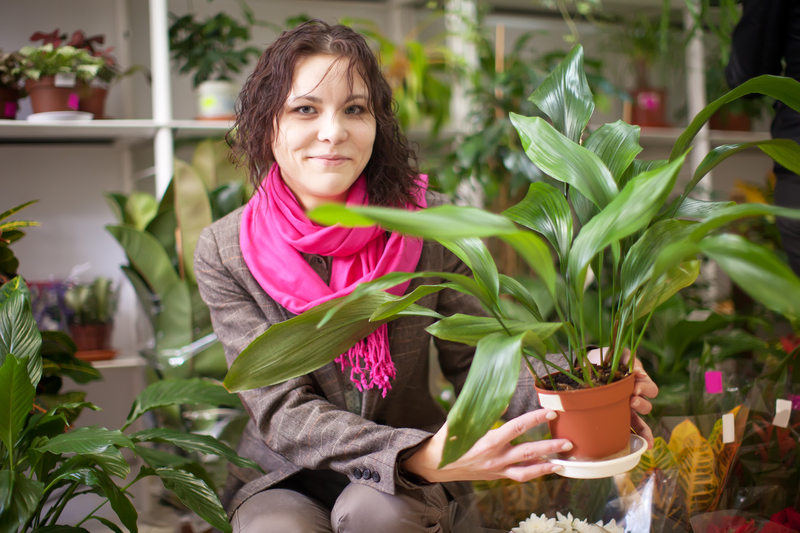Crafting Lush Gardens from Organic Byproducts
Posted on 31/05/2025
Crafting Lush Gardens from Organic Byproducts: The Ultimate Guide
Imagine cultivating a vibrant, flourishing garden using materials that would otherwise go to waste. Crafting lush gardens from organic byproducts is not only eco-friendly but also budget-savvy, turning kitchen scraps, yard debris, and other organic leftovers into rich, fertile soil and natural fertilizers. In this comprehensive guide, you'll discover the myriad ways to harness the power of organic byproducts, transforming your outdoor space into a green paradise while reducing your environmental footprint.

Why Use Organic Byproducts in Your Garden?
Organic byproducts--ranging from vegetable peels to coffee grounds--are loaded with nutrients that can be recycled into your garden. This eco-conscious approach offers numerous benefits:
- Reduces landfill waste: Diverting organic waste from the trash diminishes methane emissions and landfill overflow.
- Enriches soil: Compost and mulches from organic byproducts revitalize soil structure, improve water retention, and provide essential nutrients for plant growth.
- Saves money: You'll spend less on commercial fertilizers, compost, and soil amendments.
- Supports healthy plant growth: Plants fed with organic matter are often lusher, more resilient, and less prone to pests and diseases.
Understanding Organic Byproducts
Organic byproducts are any biodegradable leftovers from plants or animals. They range from kitchen scraps (like fruit and vegetable peels) to yard refuse (grass clippings, leaves, branches). The key is that these materials break down naturally and return nutrients to the soil, forming the backbone of sustainable garden practices.
Types of Organic Byproducts for Lush Gardens
To effectively use organic byproducts for lush garden crafting, it's important to recognize the diverse materials you can utilize:
1. Kitchen Scraps
- Vegetable and fruit peels
- Coffee grounds and filters
- Eggshells
- Tea bags (biodegradable)
These scraps are nutrient-rich and ideal for both composting and direct garden application.
2. Yard Waste
- Grass clippings
- Leaves
- Twigs and branches (shredded)
- Plant trimmings
Regularly collecting and repurposing these materials adds organic matter to the soil, improving its texture and fertility.
3. Livestock Manure
- Composted chicken, cow, or horse manure
Properly composted manure is a powerful soil enhancer, supplying plants with a steady nitrogen source.
4. Wood Ash and Sawdust
- Wood ash (from untreated wood)
- Sawdust (used sparingly and well-aged)
Both can amend your soil, altering pH levels and improving soil structure, but should be used with care.
How to Turn Organic Byproducts into Gardening Gold
Crafting a thriving, sustainable garden begins with efficient processing of organic byproducts. Here's how you can integrate these materials into your gardening routine:
1. Composting
Composting is the process of transforming organic waste into humus--a dark, nutrient-rich soil amendment. Follow these steps to create lush gardens using composted byproducts:
- Choose a compost bin or designate a spot in your yard.
- Add green materials (nitrogen-rich), such as vegetable peels, coffee grounds, grass clippings.
- Incorporate brown materials (carbon-rich), such as dry leaves, straw, shredded paper.
- Maintain a balanced ratio of greens to browns (about 1:3 ratio for optimal decomposition).
- Turn the pile regularly to aerate and speed up the composting process.
- Keep the pile moist (like a wrung-out sponge) for microbial activity.
After several months, your compost will be ready to apply to garden beds, potted plants, and lawns.
2. Mulching with Yard Waste
Organic mulching is a fantastic way to suppress weeds, retain soil moisture, and steadily add nutrients back into garden beds.
- Shredded leaves and grass clippings make excellent mulch material.
- Apply 2-4 inches thick around plants, leaving space around stems to prevent rot.
- Renew regularly as the mulch breaks down and becomes part of the soil.
3. Fertilizing with Manure and Organic Tea
Livestock manure (fully composted) and homemade organic teas create garden fertility boosters:
- Mix aged manure into soil before planting or as a top dressing during the growing season.
- Make compost or manure tea by steeping compost or manure in water for several days, then use as a liquid feed for plants.
4. Direct Incorporation of Byproducts into Soil
Some organic byproducts like chopped leaves or finely ground egg shells can be worked straight into the soil, enhancing structure and nutrient content over time.
Best Practices for Utilizing Organic Byproducts
For successful crafting of fertile gardens using organic byproducts, keep these guidelines in mind:
- Avoid meat, dairy, oils, or diseased plants in home compost--they attract pests and slow down decomposition.
- Shred or chop materials--smaller pieces break down more quickly in compost and mulch.
- Monitor moisture levels in compost and mulch to prevent rot or dryness.
- Rotate mulches and compost applications according to season and crop rotations.
Common Pitfalls to Avoid
- Too much green material: Causes smelly, soggy piles--always mix with dry, carbon-rich ingredients.
- Excess wood ash or sawdust: Can alter soil pH--use sparingly and only from untreated sources.
- Adding pet waste: May introduce harmful pathogens--avoid unless absolutely certain it's safe and fully composted.
Special Techniques: Vermicomposting and Bokashi
There are alternative and advanced ways to turn organic byproducts into gardening treasure:
Vermicomposting
Red wiggler worms break down kitchen scraps much faster than traditional compost piles. Their castings are rich in nutrients and beneficial microbes, perfect for seed starting mixes and top-dressings.
- Set up a worm bin and feed regularly with kitchen scraps and shredded paper.
- Harvest vermicompost every few months for ultra-rich soil amendment.
Bokashi Fermentation
This Japanese-inspired process uses bran infused with beneficial microbes to ferment food waste anaerobically.
- Add all types of food waste--including meat and dairy--to a sealed Bokashi bucket with bran.
- After fermentation, bury the contents in your garden beds to complete decomposition and enrich the soil.
Innovative Applications: Beyond Compost
Crafting lush gardens from organic byproducts doesn't end at compost. Explore these creative garden uses:
- Eggshell powder: Crushed and sprinkled at the base of plants to deter slugs and add calcium.
- Coffee grounds: Lightly mixed into soil for acid-loving plants like blueberries and azaleas.
- Banana peels: Buried near roses for an extra potassium boost.
- DIY garden containers: Large melon rinds or coconut shells can serve as seed-starting pots.
Water Conservation Techniques
Organic mulches reduce evaporation and keep the soil cooler during hot seasons. Crafting water-efficient gardens using organic byproducts ensures sustainable, lush landscapes even in dry climates.
- Apply thick layers of mulch around drought-tolerant plants and vegetables.
- Use compost to improve soil texture and water retention capacity.
Success Stories: Transforming Spaces with Organic Byproducts
Across the globe, individuals and communities have revitalized barren plots into lush gardens by harnessing organic refuse:
- The Edible Schoolyard Project: This initiative transformed food scraps and garden waste from a local school into compost, enriching vegetable beds and teaching students about sustainable living.
- Urban Community Gardens: Many city gardens rely on shared composting and mulching, diverting tons of organic byproducts from landfills annually.
- Home Gardeners: Suburban families report saving hundreds of dollars each year by making compost and mulch from their own kitchen and yard waste.

Frequently Asked Questions on Organic Byproduct Gardening
Is composting smelly or hard to manage?
No, as long as you balance browns (carbon) and greens (nitrogen) and turn your pile regularly, it should produce minimal odor.
Can I compost weeds and grass clippings?
Yes, but avoid composting weeds with seeds or invasive species, as seeds may not be destroyed in a small compost heap.
How long does it take to create compost?
Depending on pile size, material balance, and aeration, quality compost can be ready in 2-6 months.
Is this method suitable for all garden types?
Absolutely. Whether you have raised beds, in-ground plots, containers, or edible landscapes, crafting lush gardens from organic byproducts is adaptable and scalable.
Conclusion: Start Your Lush Garden Journey Today!
Crafting a lush garden from organic byproducts is one of the most rewarding--and responsible--ways to garden. With a little knowledge and regular effort, you'll turn food scraps and yard debris into rich, regenerative soil and thriving plants. Not only does this approach save money and conserve resources, but it also closes the loop on waste, creating a more sustainable world--one garden at a time.
Begin collecting your kitchen scraps, yard waste, and natural byproducts today! With the tips and techniques in this guide, you'll enjoy lusher, greener gardens and healthier harvests while caring for the planet.
If you're ready for deeper learning, follow more practical guides and local gardening workshops for best results.



